Petco Health and Wellness Company Bundle
Who Really Owns Petco Health and Wellness Company?
Unraveling the ownership of Petco Health and Wellness Company is key to understanding its strategic moves and market dominance. From its humble beginnings in 1965 as a mail-order veterinary supply company, Petco has transformed into a leading pet care retailer. This deep dive into Petco's ownership history reveals a fascinating journey through private equity and public markets.
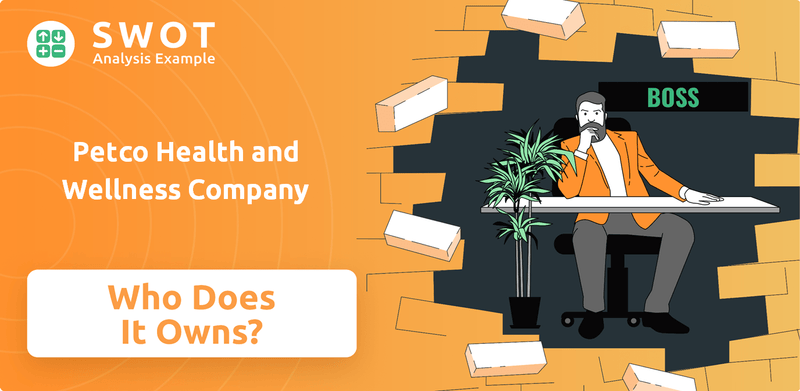
Understanding Petco Health and Wellness Company SWOT Analysis is crucial when exploring Petco's ownership, as it impacts its competitive positioning and future strategies. The company's evolution from a private entity to a publicly traded one, and back again, offers valuable insights into the influence of different stakeholders. This analysis will explore the current ownership structure, its major shareholders, and the factors shaping Petco's corporate landscape, including who is the CEO of Petco and its board of directors.
Who Founded Petco Health and Wellness Company?
The story of Petco Health and Wellness Company began in 1965 with Walter Evans, a co-owner of a pet supply distributor named United Pharmacal Company (UPCO). Evans, along with five associates, initiated a mail-order veterinary supply business in San Diego County, California. Evans served as the first CEO of this early venture, setting the stage for what would become a major player in the pet industry.
The company's initial retail presence emerged in 1976 with the opening of its first store in La Mesa, California. This store offered pet and veterinary supplies. The company was rebranded as Petco in 1979, marking a significant step in its evolution from a mail-order business to a retail chain. While the specifics of the initial ownership structure are not publicly available, this period laid the groundwork for Petco's future growth.
The early growth of Petco included the acquisition of two other West Coast chains, Wellpet, Inc. and The Pet Department, in 1988. This strategic move significantly expanded its store count from 40 to 130 and extended its reach into Oregon and Washington. This expansion also introduced live animals into their stores, enhancing the retail experience. In 1988, the company was acquired by private equity firms The Spectrum Group, Inc. and the Thomas H. Lee Company. By 1990, Brian K. Devine was brought in as president and CEO to lead a turnaround due to substantial debt.
The early years of Petco were marked by significant milestones and strategic shifts that shaped its trajectory. These included the transition from a mail-order business to a retail chain, acquisitions that expanded its store network, and the introduction of new product offerings. The company's early evolution highlights key decisions that set the foundation for its future success. For more detailed insights into Petco's journey, you can explore the history and evolution of the company here.
- Walter Evans, along with five associates, started a mail-order veterinary supply business in 1965.
- The first retail store opened in 1976 in La Mesa, California.
- The company was rebranded as Petco in 1979.
- Acquisitions in 1988 expanded the store count and introduced new products.
Petco Health and Wellness Company SWOT Analysis
- Complete SWOT Breakdown
- Fully Customizable
- Editable in Excel & Word
- Professional Formatting
- Investor-Ready Format
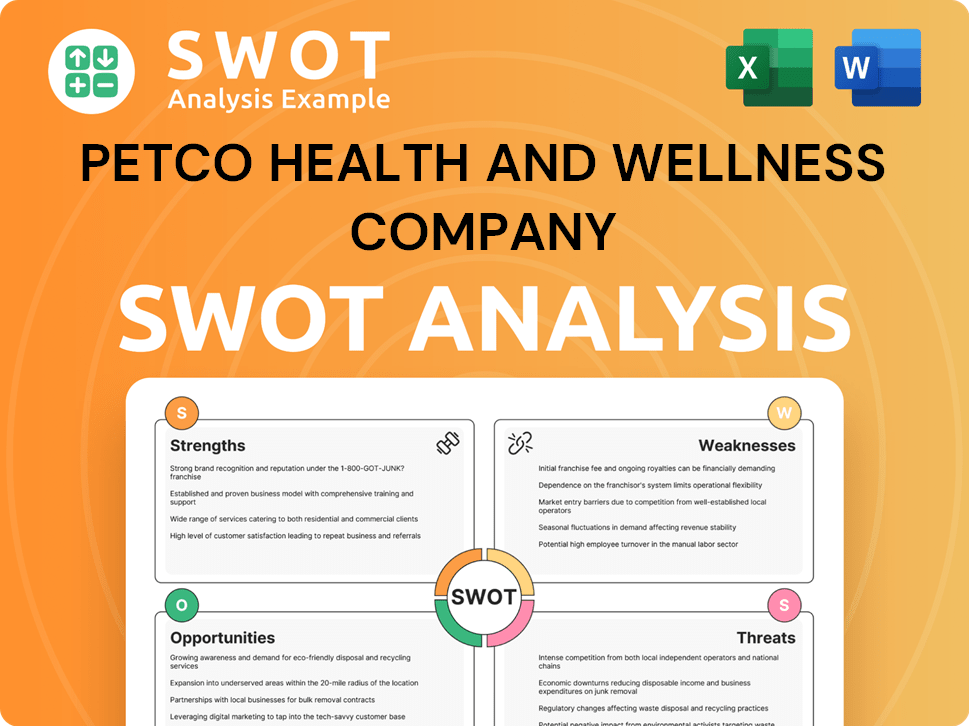
How Has Petco Health and Wellness Company’s Ownership Changed Over Time?
The ownership of Petco Health and Wellness Company has seen considerable shifts, reflecting its journey through both private and public markets. Initially, the company went public in 1994, then was taken private in 2000 by Leonard Green & Partners (LGP) and TPG Capital (TPG). This was followed by another IPO in 2002, and a subsequent privatization in 2006, again led by TPG. These changes highlight the dynamic nature of the company's structure and its adaptation to various market conditions.
A pivotal change occurred in early 2016 when TPG and Leonard Green sold Petco to CVC Capital Partners and the Canada Pension Plan Investment Board (CPPIB) for $4.6 billion. These entities maintained control through Petco's third IPO in January 2021, which listed on NASDAQ under the ticker 'WOOF.' This IPO raised approximately $864 million, primarily for debt reduction. This evolution demonstrates the company's adaptability and its ability to navigate financial landscapes.
| Event | Year | Details |
|---|---|---|
| Initial Public Offering (IPO) | 1994 | Listed on NASDAQ under the ticker 'PETC'. |
| Private Ownership | 2000 | Acquired by Leonard Green & Partners (LGP) and TPG Capital (TPG) in a $600 million leveraged buyout. |
| Secondary Public Offering | 2002 | LGP and TPG took Petco public again on NASDAQ. |
| Private Ownership | 2006 | Taken private by private equity investment groups led by TPG in a $1.7 billion deal. |
| Sale to CVC and CPPIB | 2016 | TPG and Leonard Green sold Petco to CVC Capital Partners and the Canada Pension Plan Investment Board (CPPIB) for $4.6 billion. |
| Third Public Offering (IPO) | 2021 | Listed on NASDAQ under the new ticker 'WOOF', raising $864 million. |
As of March 31, 2025, the major institutional shareholders of Petco Health & Wellness Company include CVC Management Holdings II Ltd. with 145,924,140 shares and Canada Pension Plan Investment Board with 59,765,368 shares. Other significant investors include BlackRock, Inc., Vanguard Group Inc., and Morgan Stanley. Overall, institutional shareholders own 128.47% of Petco Health & Wellness Company. Scooby Aggregator LP is noted as the largest individual shareholder, owning 145.92 million shares, representing 60.50% of the company. For more information on the company's marketing strategies, you can read about the Marketing Strategy of Petco Health and Wellness Company.
Petco Health and Wellness Company PESTLE Analysis
- Covers All 6 PESTLE Categories
- No Research Needed – Save Hours of Work
- Built by Experts, Trusted by Consultants
- Instant Download, Ready to Use
- 100% Editable, Fully Customizable
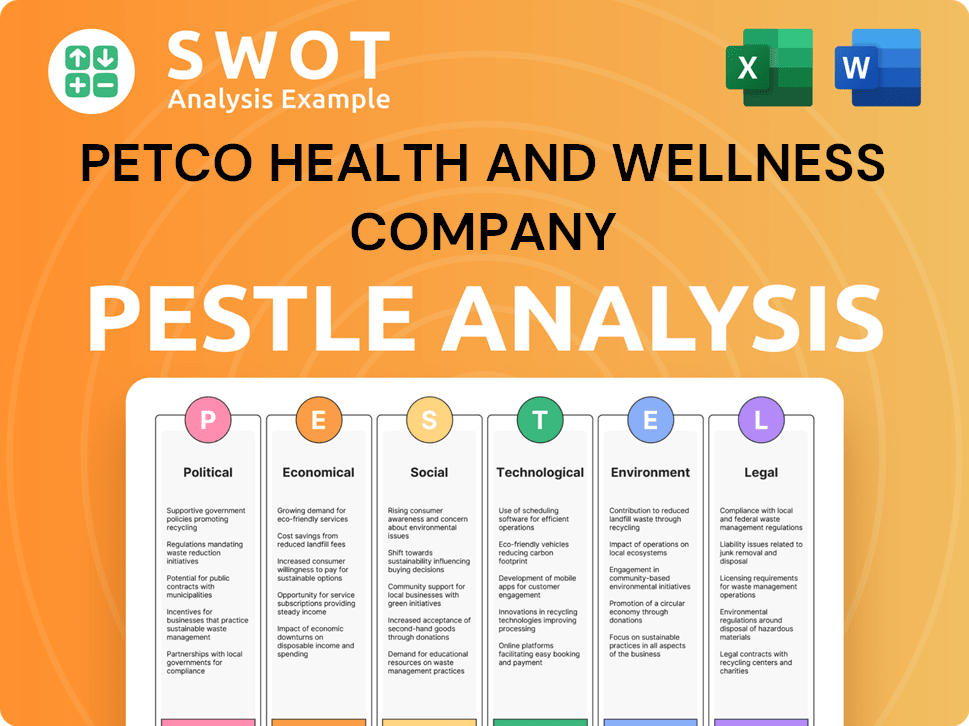
Who Sits on Petco Health and Wellness Company’s Board?
The board of directors at Petco Health and Wellness Company plays a vital role in guiding the company's strategy. As of July 2024, Glenn Murphy holds the position of Executive Chairman. Recently, there have been leadership changes, with Joel Anderson becoming the new CEO on July 29, 2024, and also joining the board. He replaced R. Michael Mohan, who served as interim CEO from March 2024 after Ron Coughlin stepped down. Mohan, who had been on the Petco board since March 2021 and served as lead independent director since July 2021, now chairs a new committee for Petco's board focusing on value creation.
The board's composition reflects the interests of major shareholders and independent directors. Sabrina Simmons, who was a member of Petco's Board of Directors and Audit Chair since 2021, resigned from her board role in February 2025 to take on the position of Chief Financial Officer. Following Ron Coughlin's departure, the board's size was reduced from 11 to 10 members. This structure is designed to ensure effective oversight and strategic direction for the company, as it navigates the competitive pet care market.
| Board Member | Title | Date Joined Board |
|---|---|---|
| Glenn Murphy | Executive Chairman | N/A |
| Joel Anderson | CEO and Director | July 29, 2024 |
| R. Michael Mohan | Director | March 2021 |
While specific details on dual-class shares or special voting rights are not explicitly detailed, the significant holdings of CVC Capital Partners and the Canada Pension Plan Investment Board suggest substantial voting power. Scooby Aggregator LP, representing a large portion of the company's shares, also indicates concentrated ownership. The company's focus on 'strengthening our retail fundamentals, driving profit improvement and return us to growth' under the new leadership team, as stated by CEO Joel Anderson in February 2025, indicates the board's emphasis on operational and financial performance. For more insights into the company's strategic direction, you can read about the Growth Strategy of Petco Health and Wellness Company.
Petco's board is led by Executive Chairman Glenn Murphy, with Joel Anderson as the new CEO. The board's composition includes both major shareholder representatives and independent directors.
- Leadership changes reflect a focus on operational and financial improvements.
- Major shareholders, such as CVC Capital Partners, hold significant voting power.
- The board's focus is on driving growth and improving financial performance.
- The company's structure is designed to ensure effective oversight.
Petco Health and Wellness Company Business Model Canvas
- Complete 9-Block Business Model Canvas
- Effortlessly Communicate Your Business Strategy
- Investor-Ready BMC Format
- 100% Editable and Customizable
- Clear and Structured Layout
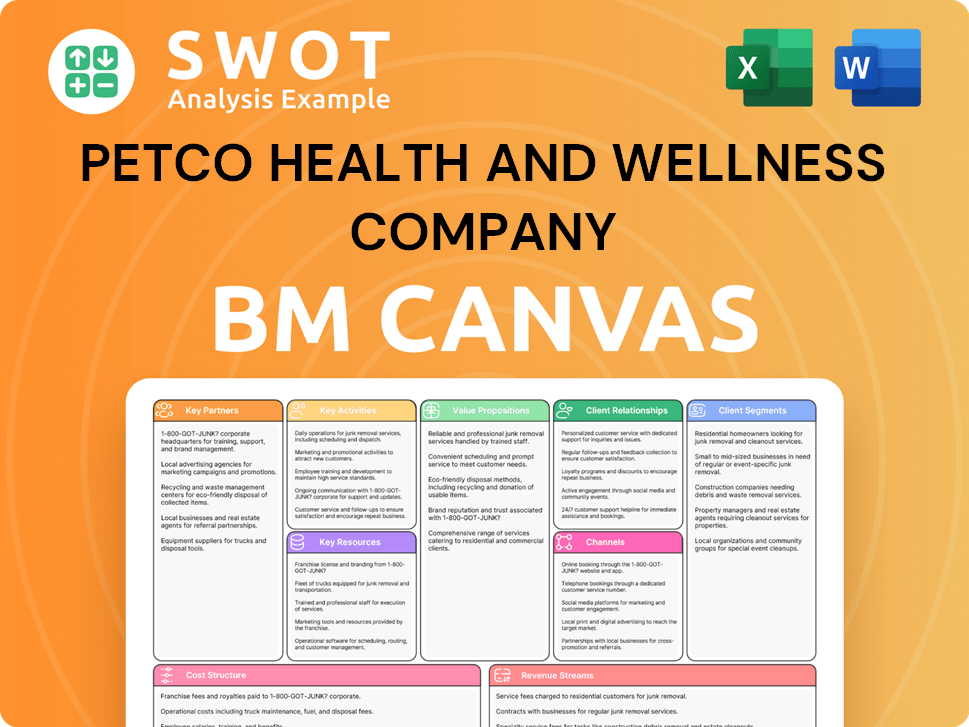
What Recent Changes Have Shaped Petco Health and Wellness Company’s Ownership Landscape?
In recent years, the Petco Health and Wellness Company has experienced significant shifts in its ownership and leadership. Following its third IPO in January 2021, CVC Capital Partners and Canada Pension Plan Investment Board maintained majority control. This strategic move aimed to reduce the company's debt burden and reposition itself in the market. Understanding the Petco ownership structure is key to grasping the company's strategic direction.
The Petco company structure has also seen changes in its executive leadership. Ron Coughlin stepped down as CEO and Chairman in March 2024, with R. Michael Mohan taking over as interim CEO. Joel Anderson was appointed as the permanent CEO, effective July 29, 2024. Moreover, several key executive appointments were made in late 2024 and early 2025, including Sabrina Simmons as Chief Financial Officer, Michael Romanko as Chief Customer and Product Officer, and Jack Stout as Chief Merchandising Officer. These changes are designed to boost operational efficiencies and foster profitable growth. For more insights into the business, you can explore the Revenue Streams & Business Model of Petco Health and Wellness Company.
Petco has been actively reshaping its retail footprint. The company plans to close up to 30 underperforming stores in 2025, following 25 closures in 2024, to streamline operations and adapt to changing consumer behaviors. Despite these closures, Petco aims for improved gross margins and adjusted EBITDA in 2025, with a target of $375 million to $390 million. The company reported a net revenue of $6.1 billion for the full year 2024. The Petco parent company continues to navigate the evolving retail landscape.
| Ownership Aspect | Details | Recent Developments |
|---|---|---|
| IPO and Ownership | Third IPO in January 2021 | CVC Capital Partners and Canada Pension Plan Investment Board retained majority control. |
| Leadership Changes | CEO Transition | Ron Coughlin stepped down; R. Michael Mohan (Interim), Joel Anderson (Permanent). |
| Financial Performance | 2024 Revenue | Net revenue of $6.1 billion. |
Ron Coughlin stepped down as CEO. Joel Anderson became the new CEO in July 2024. Several new executive appointments were made to strengthen the team.
Up to 30 stores will close in 2025. 25 stores closed in 2024. This is part of a broader strategy to adapt to digital trends.
Aiming for improved gross margins in 2025. Adjusted EBITDA target of $375 million to $390 million. Focus on profitable growth.
Pet ownership remains high in the U.S. The 'humanization' trend drives new offerings. Pet services revenue expected to double by 2030.
Petco Health and Wellness Company Porter's Five Forces Analysis
- Covers All 5 Competitive Forces in Detail
- Structured for Consultants, Students, and Founders
- 100% Editable in Microsoft Word & Excel
- Instant Digital Download – Use Immediately
- Compatible with Mac & PC – Fully Unlocked
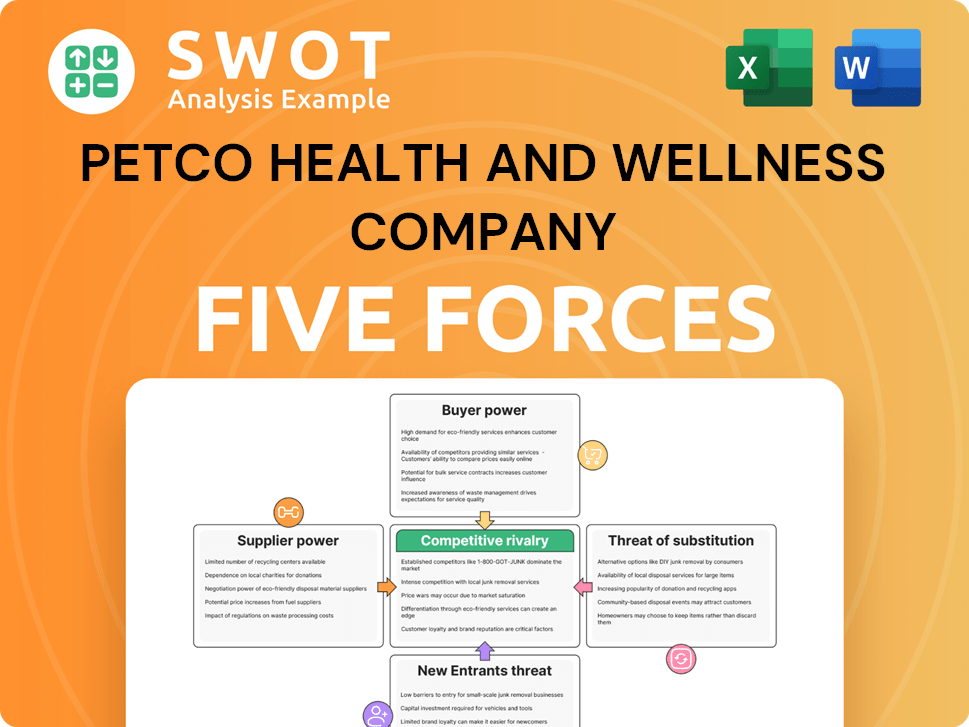
Related Blogs
- What are Mission Vision & Core Values of Petco Health and Wellness Company Company?
- What is Competitive Landscape of Petco Health and Wellness Company Company?
- What is Growth Strategy and Future Prospects of Petco Health and Wellness Company Company?
- How Does Petco Health and Wellness Company Company Work?
- What is Sales and Marketing Strategy of Petco Health and Wellness Company Company?
- What is Brief History of Petco Health and Wellness Company Company?
- What is Customer Demographics and Target Market of Petco Health and Wellness Company Company?
Disclaimer
All information, articles, and product details provided on this website are for general informational and educational purposes only. We do not claim any ownership over, nor do we intend to infringe upon, any trademarks, copyrights, logos, brand names, or other intellectual property mentioned or depicted on this site. Such intellectual property remains the property of its respective owners, and any references here are made solely for identification or informational purposes, without implying any affiliation, endorsement, or partnership.
We make no representations or warranties, express or implied, regarding the accuracy, completeness, or suitability of any content or products presented. Nothing on this website should be construed as legal, tax, investment, financial, medical, or other professional advice. In addition, no part of this site—including articles or product references—constitutes a solicitation, recommendation, endorsement, advertisement, or offer to buy or sell any securities, franchises, or other financial instruments, particularly in jurisdictions where such activity would be unlawful.
All content is of a general nature and may not address the specific circumstances of any individual or entity. It is not a substitute for professional advice or services. Any actions you take based on the information provided here are strictly at your own risk. You accept full responsibility for any decisions or outcomes arising from your use of this website and agree to release us from any liability in connection with your use of, or reliance upon, the content or products found herein.